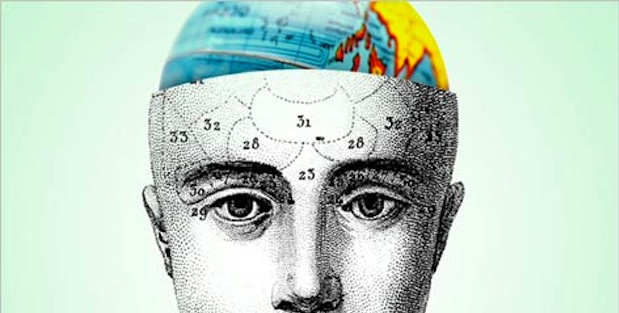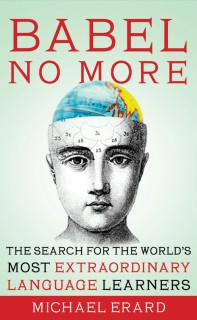It seems like days ago, but in fact it has been less than 12 hours since I left New York for Paris, where Vannina Boussouf and I are spending the week recruiting new faculty for the Lycée Français. I say it seems like days because while my plane departed at around 10pm last night, fine timing for a decent sleep, I barely closed my eyes during the flight, absorbed as I was in the book I had grabbed on my way out the door.
Entitled “Babel No More: The Search for the World’s Most Extraordinary Language Learners” and written by the linguist Michael Erard, it is one into which I had delved on many occasions in the past, without ever having found the time to read the book from cover to cover. Well, the time is upon me, I had thought, stuffing it into my briefcase.
Waiter, another coffee!
Little did I know that I would be unable to put it down, that I would finish it five minutes ago at a Parisian café on a Sunday afternoon, that no sooner would I read the last word than I would want to start writing about it for the LFNY Life blog. Waiter, another coffee, if you please!
“Babel No More” tells the story of Erard’s quest to understand why some people are capable of learning 20, 30, 40 or even more different languages. He begins with the tale of a 19th Century professor at the University of Bologna called Giusepe Mezzofanti, legendary in his own lifetime for mastering perhaps as many as 50 distinct languages.
Lord Byron once quipped about Mezzofanti that he was someone “who ought to have existed at the time of the Tower of Babel, as universal interpreter” and indeed the more one learns about this “hyperpolyglot” the more one comes to understand both his gift and the exceptional power of that gift as a means of unifying and even elevating humanity to new heights of peace, prosperity and progress.
“Hyperpolyglot”

Erard travels to Italy to learn more about the professor, but unable to draw definitive conclusions about the mechanisms of what he terms “high-intensity” language learning, the author then undertakes a mission to study other exceptionally plurilingual individuals, individuals to whom he refers as “avatars” of the human “will to plasticity…the belief that we can, if we so wish, reshape our brains”. In other words, people so deeply passionate about and dedicated to learning languages that they can literally will their minds to acquire one after another, again and again and again.
The book recounts a mesmerizing journey of discovery (nb. if you would like to learn more about Erard’s research, I would highly recommend that you read “Babel No More”; you can also watch the hour-long lecture he gave this past May for Google.)
Languages, creativity and critical thinking
Yet what strikes me most is the similarity I discern between the hyperpolyglot protagonists Erard encounters on his odyssey and the wonderfully plurilingual community which is the Lycée Français de New York. If we were to imagine melding the some 3,000 individuals who compose our school into a single person, we too could laud the fact that we are able to speak dozens of languages with impressive fluency.
Like Mezzafanti and others of his ilk, the Lycée Français has a truly extraordinary relationship with language, one that is inherent of course in our remarkable cultural diversity, but one that results above all from our tireless determination to learn more languages than those with which we are fortunate enough to be born.
For us, there appears to be a correlation between language learning on the one hand and cognitive sophistication, creativity, critical thinking, empathy and other such qualities on the other hand. It is not an accident our school is so profoundly committed to bilingualism; it is not an accident we hope as many of our students as possible will begin a third language in sixth grade; it is not an accident the Lycée Français intends to help our young people learn a fourth language by the time they leave us for college.
As I sit here, at a café called L’Ecritoire, with “Babel No More” beside me and my laptop in front of me, jetlag is the farthest thought from my mind. I am doing everything I can to refrain from telling the strangers all around me just how deeply proud of our students I am. A few of my neighbors have been glancing in my direction, wondering no doubt why I am typing with such conviction, but I will leave that secret, dear reader, with us.
About the Author :
Sean Lynch was Head of School at the Lycée Français de New York from 2011 to 2018, after having spent 15 years at another French bilingual school outside of Paris: the Lycée International de St. Germain-en-Laye. Holding both French and American nationalities, educated in France (Sciences Po Paris) and the United States (Yale), and as the proud husband of a French-American spouse and father of two French-American daughters, Sean Lynch has spent his entire professional and personal life at the junction between the languages, cultures and educational systems of France and the United States. In addition to being passionate about education, he loves everything related to the mountains, particularly the Parc National du Mercantour.


